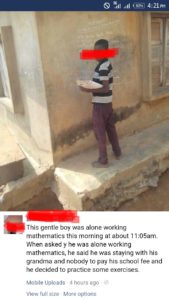
Reading has transformed human consciousness and changed the world. Aside from serving as a powerful medium of communication and a source of pleasure, it opened the gate to knowledge about virtually everything that is important… Reading involves interpretation and imagination; it is a cultural accomplishment through which meaning is gained. Reading ‘between the lines’ allows readers to use their imagination and knowledge to understand and gain meaning from the text in front of them.
– Cadogna (Preface of Power of Reading by Frank Furedi)
In 21st century Nigeria, the country is at a cross road on how to educate its young and growing population. With over 10 Million out-of-school children in the country and an adult illiteracy level of 65 Million, there is the necessity for well-meaning individuals and groups in the country to be more proactive and make use of accessible and sustainable approaches in providing disadvantaged individuals and communities in the country access to reading and educational materials in both English and indigenous Nigerian languages.
From a sociological point of view, the significant development from the fourteenth century onwards, and especially in the fifteenth and sixteenth centuries, was the emergence of the self-conscious reader. At this point, what readers do begins to become important, and this activity assumes an important role in the construction of the identity of the self.
The social definition of literacy in Nigeria is very narrow and limiting, as it considers English language as the only means of distinguishing between a literate and an illiterate person in the country. Although, there are over 450 ethnic groups and languages in the country, the definition is very limiting and non-inclusive of the whole populace of the country. Hence, such a definition potentially cuts out a significant number of the populace from any meaningful engagement in the socio-political discourse and activities in the country, as well as, other meaningful economic activities.

In as much as there is the need for Nigeria as a country to have a general language in carrying out its official and national activities, a role English language has been able to fulfil. However, there is the urgent and necessary need to have an inclusive society that embraces all, irrespective of their ability to read or write in English language. Also, there is the necessity to preserve indigenous Nigerian languages from going into extinction.
The question is what Nigerians want their pets to say. The country’s 182 million people speak 520 different languages…
The language barrier means some pollys can accidentally squawk parrot profanities.
In Kano, Mr. Mohammad bought a second-hand parrot from an American or possibly British expat leaving Nigeria. When he peered into the cage, the bird blared back: “Waka, waka!” In Hausa, this is a very bad thing for a bird to say. Roughly translated, it means “your mother.”
“That one was misbehaving,” Mr. Mohammad recalled. “It took a long time to sell.”
I remember whilst on a walk in a park, I met a Dutchman who was dog-walking and we got engaged in a brief discussion and he told me he’s Dutch and I asked him about the use of Dutch as the language of formal education in the Netherlands and he said “Our country is not big and there is no way we can communicate with the rest of the world in Dutch, hence, we have it as part of our education system to learn English language”.
For the Netherlands maybe it’s not a complicated problem but for Nigeria it is definitely a complicated issue. Take for instance, the World Street journal (WSJ) article on the parrot market in Nigeria and the fact that Nigerian parrots can potentially speak in any of the over 500 languages in the country.
There are over eighty (80) ethnic groups found in Taraba State each with its distinct historical and cultural heritage cohabiting peacefully with one another. Some of these tribes include Mumuye, Ichen, Wurkum, Mambilla, Kuteb, Chamba, Jukun, Yandang, Fulani, Jenjo, Kunini, Lo, Ndoro,Kambu, Kaka, Bandawa, Mung, Tiv, Zo, Bambuka, Jibu and Jole.
Taraba state in Nigeria has over 80 ethnic groups that are native to it. That is definitely more than the number of native ethnic groups one would get in some countries in the world. Whilst it is important to learn to use English language as the national official language for ease of communication and coordination of the country’s economic and political activities. It is also very important that indigenous Nigerian languages are preserved, promoted and their usage encouraged. Major radio and TV programs and print materials in the country can be mass interpreted into the different languages in the country, producing a Nigerian information-wiki that is focussed on indigenous Nigerian languages.
When evening has come, I return and go into my study. At the door I take off my clothes of the day, covered with mud and mire, and I put on my regal and courtly garments; and decently re-clothed, I enter the ancient courts of ancient men, where, received by them lovingly, I feed on the food that alone is mine and that I was born for. There I am not ashamed to speak with them and to ask them the reasons for their actions; and they in their humanity reply to me. And for the space of four hours I feel no boredom, I forget every pain, I do not fear poverty, death does not frighten me. I deliver myself entirely to them.
– Machiavelli (Quoted in Power of Reading by Frank Furedi)
More important, the community radio sector can be used to make information and knowledge accessible to local communities in the country. The use of community radio would most likely provide a more accessible and inclusive means of delivering information and knowledge to most disadvantage communities and individuals in the country than the options on offer from the world of digital technologies. Hence, there is the need to promote the establishment of community radio stations in every community in the country. And with the use of volunteers such a project can be achieved and this would help to engage a group of people in the country that probably would not have been involved in some of the important public discourse in the country.
Both the Greeks and the Romans had regarded the teaching of reading as ‘something anybody could do’. That the acquisition of literacy later in the nineteenth century did not in fact seem to require the input of sophisticated professionals is highlighted by the fact that in England almost 90 per cent of the population could read before the Education Act of 1870 – that is, before elementary school was widely available to children.
I remember at my place of work in 2011, the oldest member of staff kept an annual diary (updated on a daily basis) in his native Nigerian language for over twenty eight years. And he used to read a local newspaper, listen to international and local news in his native Nigerian language and despite all these, he told me that he never had any formal education. However, he was the most informed on current affairs issues in the office. If such an individual could access higher levels of intellectual materials in different fields in his native language his self-education would have been more advanced and perhaps, it would be easier to formalise such an acquired knowledge within the context of the Nigerian education system that is still certificate driven. Also, such an individual would have better chances of getting employed in more advanced roles in the country and potentially contribute more to the socio-economic activities in the country.
Please, leave your thoughts on this post in the comment section and feel free to share the article with your contacts. Thanks for taking out of your precious time to read my article/s!
If you like this post, kindly subscribe and/or follow me on Twitter @otukogbe and @EdusoundsNg or on Facebook at edusoundsng.





Thanks. You’ve just said my mind out clearly and loudly. An average Nigerian still thinks and believe that once you can’t speak or read English language you are not literate which is absolutely untrue!
In trying to use radio for reaching out to others that may not be privileged to learn English language, it is nice. There was a time that used to happen in the south west for national programs (if you are remember NTA channel 7) this station was majorly in Yoruba language because that is the major local language in Lagos (and 2nd official language in certain quaters) now nta 7 is dead! So the federal government don’t have direct access to Yoruba tribe via TV (this may be especially true for people in Lagos) not necessarily true for others in oyo, ondo, ekiti, ogun, and osun… The Yoruba dominated region, however in radio broadcasting bond fm is the only federal radio station in Lagos that has a slot for Yoruba program and news. State radio stations are feeling the gap.
South west don’t have as much tribes as the north for example having a radio station that can cater for the need of her people may not be demanding but for the northern part, it will definitely be. So I still feel from those tribes there will still be about 3-5 of them that most people in that region will understand a pilot study can commence from there and improvement on it later done.
Note my statements above are purely base on my experience in southwest, but in the north I also know they have a state nta that offer programs in local language and they only join the national nta when there is a national issue (eg news) and immediately it will be translated to the local diallet when the national program finishes. This I know is to carry along those that may not understand the English language.
All in all more still need to be done to bridge the gap.
I do remember NTA7 in Lagos but unfortunately it has long been shut. The main essence of community radio stations is to serve the immediate needs of the host communities. Also, with the right government policy, setting up a community radio station wouldn’t be expensive, and the government has a role in promoting and supporting the institution.
There are numerous benefits that could be derived from having community radio stations as they are usually very inclusive and very relevant to the immediate social needs of the people.
There are a few government approved community radio stations in the country (UNILAG FM is one).
There are different models of running community radio stations in order to make them viable and sustainable. For instance, some are run by volunteers, while some are run by paid staff with provision for volunteers. Usually, local businesses and individuals do sponsor such stations, and also the government has a role in providing the necessary support and incentives for the successful operations of these stations.
I’m of the opinion that every community should have a radio station that would have programs that are designed with the use of the local dialects of the respective communities, and in some instances the colloquial language of such communities.
For instance, it would be nice to listen to local radio stations where the local slangs that are not profane or offensive are used. Such programs would help in expanding and enriching the local vocabularies and languages of such communities.
Thanks for your very insightful comments.